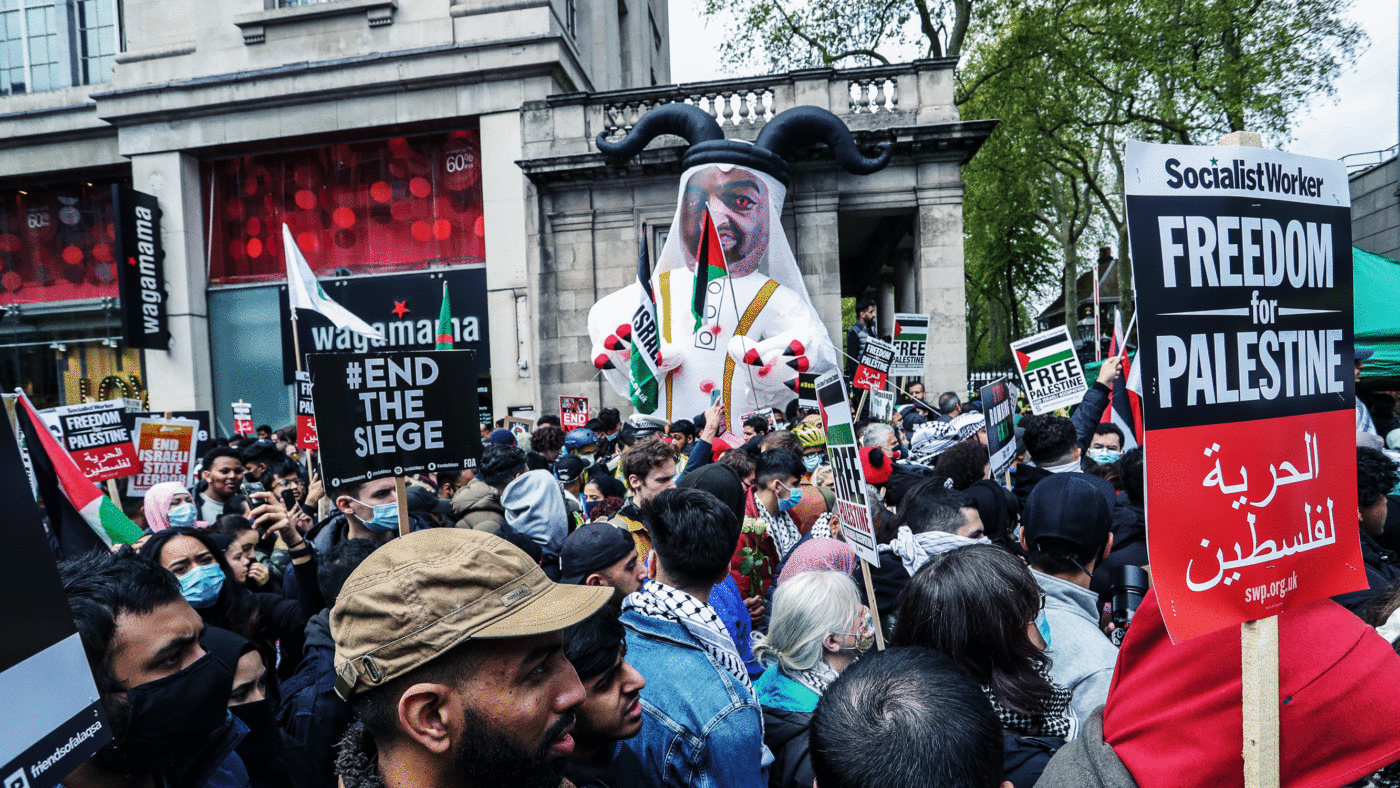On Saturday I attended a protest outside the Israeli embassy in Kensington, reluctantly disguised by my mandatory mask. I was disheartened, but far from surprised, to encounter many images, banners and audible chants expressing the most vicious anti-Semitism.
Among them were countless aggressive cries of “From the River to the Sea,” a line straight from the Hamas playbook, and plain ‘anti-Zionist protest’-speak for demanding the annihilation of the world’s only Jewish state. Some protesters paraded an effigy of Sheikh Mohamed bin Zayed bin Sultan Al Nahyan of the UAE, complete with devil horns and exaggerated features reminiscent of a medieval anti-Semitic caricature – presumably in reference to his country’s historic normalisation deal with Israel last year.
There were also multiple outbursts of “Khayber Khayber Ya Yehud jaish Mohammad Sauf Ya’ud” from a crowd wearing t-shirts with pictures of Saddam Hussein. Their choice of slogan translates from Arabic as ”Khayber Khayber oh Jews, Mohammad’s army is returning”, a reference to a historic battle in which Muslim troops let by Muhammad massacred the Jewish population of Khaybar, a fort settlement located in present-day Saudi Arabia.
Where was the Metropolitan Police in all this? The same police force that on Sunday morning issued a ‘warning‘ to the congregation of St Mary Newington for having tea and biscuits after mass, didn’t give so much as a second glance to the blatant, menacing anti-Semitism on display outside the embassy.
The subsequent arrest of four people who shouted anti-Semitic and sexually violent slurs from a convoy of cars draped in Palestinian flags is welcome, but it only came about after footage of the incident was shared on social media. It shouldn’t take the intervention of outraged citizens for the police to get involved.
Surely hate crime legislation means nothing if it doesn’t outlaw this behaviour? It is hard to imagine that the kind of banners and language used this weekend, if displayed at a far-right protest, would not have resulted in criminal charges or rigorous questioning at the very least. Yet, the largely ‘leftist’ anti-Semitic free-for-all I witnessed on Saturday was depressingly predictable. After all, our government only got round to banning the pro-Hezbollah Al Quds Day march in 2019, after decades of allowing it to disseminate pro-terror, pro-genocide propaganda and intimidation on the streets of London, bankrolled by the Iranian regime.
It’s simply not good enough to leave Britain’s Jewish population exposed to such virulent hatred. As Dr Rakib Ehsan, an independent expert in institutional trust and CapX contributor, told me:
“Political and law-enforcement institutions must demonstrate a greater degree of seriousness in tackling anti-Semitism in Britain. This includes the implementation of localised public-security strategies which command the confidence of British Jewish communities.”
However, criminalising forms of hate that involve genuine incitement, such as pro-terrorism parades and other direct calls for violence, is only applying the proverbial sticking plaster to a festering wound. Anti-Semitism is a disease that feeds off fear, inaccuracy, and lies, and only through robust education and dialogue can its spread ever be curtailed.
Better teaching of world history, including the complex history of Israel and the Middle East, is essential to counteracting what is so often a woefully skewed public debate. At the moment too much history is ‘taught’ by introducing students to isolated historical episodes almost at random. No real chronology of World or even European history is offered, and most children abandon the subject entirely by age 14. This has resulted in some pretty shocking ignorance. For instance, a survey found that two-thirds of 16 to 24-year-olds cannot name the year in which the First World War ended, and 12% believe that Waterloo was a battle in the same conflict. Is it any wonder so many people believe the idea of Israel was conjured from thin air in 1948?
At my (slightly) below run-of-the-mill comprehensive in Staffordshire, there was nothing on the history of the Middle East or Jewish history outside of the Holocaust. Studying history at university, any modules I encountered on the same topic were heavily tainted with unnecessary and inaccurate anti-Israel bias.
A more robust education system, paired with an equality before the law in regards to violent hatred, will contribute to a safer environment for all British communities, and will hopefully provide us with a powerful bulwark against importing American culture wars and their equally-deranged cousin, debunked continental critical theory, into our discourse regarding the state of Israel. If such changes are not made, we risk continuing to foster the atmosphere of anti-Semitism that has been brewing in recent years and certainly did not disappear with Jeremy Corbyn’s departure from the Labour leadership.
After Sunday’s deliberate intimidation of London’s Jewish communities, the brutal assault of a Rabbi in Chigwell, the harassment of Jewish university students, not to mention a spike in anti-Semitic incidents recorded by the Community Security Trust, it is impossible to deny the urgency of tackling anti-Jewish hatred, which is so often cloaked in the language of ‘anti-Zionism’.
The world Jewish population only amounts to around 15 million people, and the fight against anti-Jewish hatred cannot be sustained solely by the Jewish community itself. Antisemitism has long been left to fester below (and rather close to) the surface in far-left circles, and it is high time to root it out of society. Already a mere 65% of British Jews believe that they have a long-term future in the UK.
Fail to show Britain’s Jews that they do, and we risk a similar situation to across the Channel, where the last few years have seen ever increasing numbers of French Jews leaving Europe for a new life in Israel. What a sad indictment of this country that would be.
Click here to subscribe to our daily briefing – the best pieces from CapX and across the web.
CapX depends on the generosity of its readers. If you value what we do, please consider making a donation.


